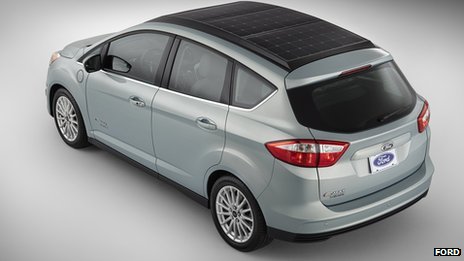The Ford Motor Company is entering the sustainable electric car market with its recently unveiled C-Max Solar Energi Concept, a car equipped with a solar panel system that could power the vehicle for up to 21 miles per charge – a performance equal to that of the best plug-in hybrid.
C-Max Solar Energi is equipped with a Fresnel lens, a solar concentrator lens that’s able to track the position of the sun and direct its rays, similar to a magnifying glass, to solar cells placed on the roof. This system enhances the vehicle’s ability to absorb sunlight by eight times the amount of a solar vehicle without the lens, providing enough power equal to a four-hour battery charge.
Innovative clean technology
The concept vehicle was collaboratively developed by Ford, California-based SunPower Corp. and Atlanta-based Georgia Institute of Technology and will debut at the 2014 International CES in Las Vegas. Unlike other electric vehicles, C-MAX Solar Energi Concept can be completely sustained through solar power alone, eliminating the need to plug-it-in ― although that’s also on option during cloudy days. Car Magazine’s Damion Smy tells BBC that it may be a while before solar cars become common, yet Ford’s use of solar technology greatly assist battery charging.

C-MAX can also drive up to 21 miles if charged by electricity from the power grid .
Ford’s internal data speculates that 75% of trips made by the average driver can be powered exclusively by solar energy, making the vehicle useful in areas with unstable or unavailable power grids.
Environmental impact
Annual greenhouse gas emission can be reduced by an estimated four metric tons per user, thanks to an EPA-estimated 108 city miles per gallon and 92 highway miles per gallon. This performance ranks the C-Max Solar Energi as having the best combined miles per gallon equivalent in its class.
Simultaneously unveiled with C-MAX Solar Energi Concept was the MyEnergi Lifestyle, a computer modeling system that helps homeowners understand how to take full advantage of their energy-efficient home appliances, solar power systems and plug-in hybrid vehicles, in an effort to reduce the carbon footprint and lower monthly energy costs.
Following the CES tradeshow, C-MAX will be tested by both Ford and Georgia tech to evaluate the vehicle’s practicality in real-world conditions and determine whether the vehicle will move beyond a concept. Greenhouse gas could be reduced by one billion metric tons annually, if C-MAX has proliferates.
Story via BBC
Advertisement
Learn more about Electronic Products Magazine





